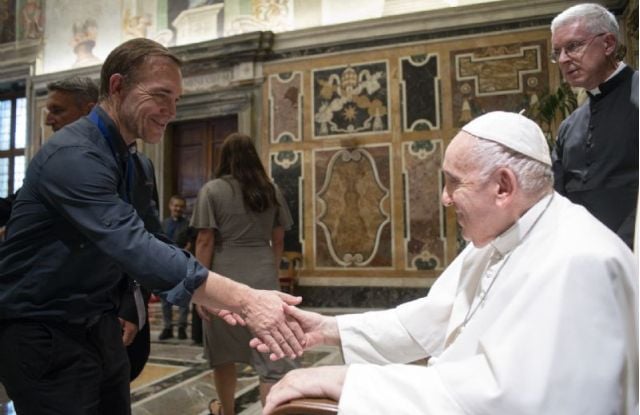Institutional church vs. community

In our community group, Amie Bokelman had surgery that left her incapacitated, yet with her little ones still running around.
Fortunately, my wife Karen loves Amie and, sensing her predicament, showed up bright and early yesterday to take Caden and Olivia to our house. It was nothing speci…
By Seth Barnes
In our community group, Amie Bokelman had surgery that left her incapacitated, yet with her little ones still running around.
The point is that God designed us human beings as communal creatures. We need one another – we need real connection and real encouragement just to make it through life. That’s why God told us not to “forsake assembling together.” That’s the point of church – not all this ecclesiological falderal you see in a lot of institutional churches.
We don’t need pseudo connection and we don’t need a pantomime. Life dishes out a steady dose of stinging wounds that can only be touched and healed in a place of deep trust where you are known and loved. Fail to find a place of encouragement with people who know how to love and you become callused and jaundiced. It’s frustrating if you settle for a facsimile of the original, but if you find it, it is so worth the search. I got the following in an email newsletter from John Eldredge last week. He really gets it. It was long, so I edited down a bit.
Going to church with hundreds of other people to sit and hear a sermon doesn’t ask much of you. It certainly will never expose you. That’s why most folks prefer it.Community will reveal where you have yet to become holy. It will bring you close and you will be seen and you will be known, and therein lies the power and therein lies the danger. Aren’t there moments when all those little companies, in all those stories, hang by a thread? Galadriel says to Frodo, “Your quest stands upon the edge of a knife. Stray but a little and it will fail, to the ruin of all. Yet hope remains while the Company is true.”Most churches survive because everyone keeps a polite distance from the others. We keep our meetings short, our conversations superficial. “So, Ted, how’s everything going on the Stewardship Committee?” “Oh, just great, Nancy. We’ve got a big goal to reach this year, but I think we’ll be able to get that gym after all.”No one is really being set free, but no one is really at odds with each other either. We have settled for safety in numbers-a comfortable, anonymous distance. An army that keeps meeting for briefings, but never breaks into platoons and goes to war. Living in the community is like camping together. For a month. In the desert. Without tents. All your stuff is scattered out there for everyone to see.A true community is something you’ll have to fight for. You’ll have to fight to get one, and you’ll have to fight to keep it afloat. But you fight for it as you bail out a life raft during a storm at sea. You want this thing to work. You need this thing to work. You can’t ditch it and jump back on the cruise ship.This is the church; this is all you have. Without it, you’ll go down. Or back to captivity. This is the reason those small house fellowships thrive in other countries: they need each other. There are no other options.
God is calling together little communities of the heart, to fight for one another and for the hearts of those who have not yet been set free. That camaraderie, that intimacy, that incredible impact by a few stouthearted souls-that is available. It is the Christian life as Jesus gave it to us. It is completely normal.



Great. Yeah, this kind of community is rare. I don’t so much look for it in a church any more as I do look for what Eldredge calls a “fellowship of the heart” – a tight-knit group of friends who would lay down their lives for one another. Some might call it a “small group,” but that entails a Bible study and a program, which isn’t what my fellowship of the heart does. We just got together with a couple that represents this kind of transparent fellowship for a long weekend of eating sushi, singing songs together, and catching up on life. Nothing against church, but I just don’t think many are set-up for this kind of long-term, covenantal investment. I’ve got a good quote on my blog about our obsession with making an institutional church meet all our communal needs; check it out here: http://jeffgoins.myadventures.org/?filename=bart-campolo-church.
I love this. God is continually showing me the importance of community & exactly what that means. It can be a painful lesson, especially as one who loves to help others through their turmoils but would prefer to run at the onset of any of my own vulnerability. God’s taken me through the desert on this one more than once. I’m finally beginning to learn though. 🙂 I love what Eldredge had to say about the reasons why small house fellowships thrive in other countries. That’s how we do church here on Guam, & I’ve never loved church more. 🙂
yes, we just had “Church” in my living room… 15 or so of us, digging into worship, digging into the word and then digging into each other! Healing, freedom; Chad Mast was on his face in a “Spirit of Travail” wept and laid hands on people – even my 5 year old Noah was weeping… come on Church!
Jesus said to love each other so the world would know we are His disciples. What I read here, I long for. I have known it in some measure at other times in my life but not now. I don’t know what changed among us but “we have settled for safety in numbers-a comfortable, anonymous distance” as it says above.
I am awaiting spinal surgery in a week’s time and have been unable to get to church, at home in a lot of pain for a couple of months now. I emailed some people to tell them where I was and that I hadn’t left. Some replies came back (not many) saying things like “we noticed you hadn’t been there so we thought there might be a problem or perhaps you had left.” But no-one had called or checked that out. My husband and 7 year old went to church last Sunday for the first time in 6 weeks and no-one asked where they had been or asked after my continuing absence.
Made me wonder how many times I haven’t made that call myself, sent that card, made that meal, gone around to check on someone. How many times I have missed the call to love and community. There are always people with needs among us.
We seem so far from the root of church. But it’s His church. He’s coming back for a loving, vibrant bride. So maybe in the 2 months recovery I face after surgery, I will get to grips first with searching my own heart before God, and then praying for His bride. If she is to be like Him, she won’t be distant, cold and wrapped up in her own concerns. She will be warm, passionate, interested and serving because she loves like He does. Time to pray methinks.
lol Carol xx
Grateful for what I have… though it is 800 miles away. It is still very much community and friendship! I have not experienced this same community in KY, but I have a totally different but wonderful community with my son!
God does allow the desert for seasons. This is the time to dig in and grow, the time to experience His presence even more, while knowing that HE will never leave you!
Hard lesson… but worth it…
Thank you Karen for loving on Amie!! Many in our family would love to be in GA helping. Jesus has given great friendship with Clint and Amie and we are grateful that they have friends to help them!!!! Blessing to you!!! Bethany Adams
Seth,
What about ritual? What about sacrament? I agree we need community. We need platoons, as Eldredge says, but does the institutional church protect something valuable too. Something we’ve always had and might always need?
I’m all for ritual and sacrament. Books by Robert Webber like “Evangelicals on the Canterbury Trail: Why Evangelicals Are Attracted to the Liturgical Church” make the case. Nothing says you can’t do ’em in your community – that’s where they started.
But they are side dishes to the main course that feeds the soul – community.
Here’s to community – AMEN!
The past year at AIM has done more for me than my 24 years of “church” every sunday morning, sunday night, wednesday night, etc. Praise God I have now seen THE CHURCH in action! Can’t wait to see how these communities grow here, in Colorado Springs, and in Michigan – this is what we’ve all been longing for, and what we’ve been made for!!!
Seth,
Joe’s a friend of mine and directed me to your post today, and I have to say, your (and John Eldredge’s) comments come as a breath of fresh air amidst the rotary-club ecclesiology so prevalent in the western church today. I think you’re both right to call out the social dryness and superficiality that results when we as disciples don’t take community seriously. But I was a little disappointed by your take on sacraments as ‘side dishes’ to the community main course in church life. It seems to me, they’re really more like the courses themselves with community being the food. In that case, sacraments are no more side dishes to community than weddings (and, if I may, consummation)are side dishes to marriage(and getting married itself is even a sacrament in some churches). Baptism and commaren’t side dishes to community, they’re ways of participating in community, just as weddings and consummation are ways of participating in marriage. I think we live in a society that doesn’t know how to take things like sacraments (or marriage for that matter) seriously. We don’t know how to take community seriously and so we can’t take these things seriously either, and vice versa. But it seems to me that taking sacraments and liturgy seriously helps us as the Church to take community seriously, to value our commitments, and show it by valuing the way we make them. Anyway, those are my thoughts and I’d value any further input you might have on the subject.
blessings,
Emmet
Emmet,
thanks for your comments. I in no way want to minimize the sacraments – they are gifts from God and breathe life into our spirit. Many a Catholic or someone from the high church tradition receives regular encouragement as they take communion. But commas it was originally practiced by the early church was part of an actual meal – just another way to celebrate community & Jesus as a part of it – not the solitary event we sometimes make it in the modern church. And baptisms and weddings are key markers along life’s trail. But they are not the trail.
Talk to folks who have lived a little while about what encourages them and regularly breathes life into them – it’s people, it’s community. It’s the joi de vivre.
I’ve never met one person whose lived to, say, my age – 50, who has talked about the sacraments in the way you refer to them, as something on par with the everyday daily bread of God’s word as spoken by his people in a hundred different encouraging ways. I know they exist, I just wonder if they’ve ever experienced the wild, unpredictable, and awesome life-giving blessing of true community. To know and be known in all our mess and struggle.
We celebrate Jesus as we celebrate his presence in us together. This is just my experience – yours may differ. But in the absence of a biblical case to the contrary, that’s what I’ve got. I just think that the focus on liturgy & ritual misses God’s point about community. You may be having a wonderful time reciting the book of common prayer while I’m dying over here and needing some specific prayer and encouragement from you.
Thanks for the comment. And if anyone else wants to weigh in, please go ahead – we’re a little off topic here, but have at it.
Goodness, who’s that hotty on the boat there?
Jo Momma
mama, you da foxie one….)
This is an AWESOME post!!! Thanks Seth.
Emmett,
I am reminded of the instructions given in the Didache about the sacraments. The author (70 AD) writes that the Eucharist is shared in the context of a meal after confession and reconciliation TO EACH OTHER.
Didache 14:1-2 But on the Lord’s day, after that ye have assembled together, break bread and give thanks, having together confessed your sins, that your sacrifice may be pure. But let not any one who hath a quarrel with his companion join with you, until they be reconciled, that your sacrifice may not be polluted
In fact this means that the sacrament can not be practiced like it is explained for practice in the first century setting within our institutional ecclesiologies. Joint confession can only occur (as a matter of function not form) within a small community. Imagine a church of 120, 400, 1000, 18,000+ attempting to share confession together, and practice reconciliation before participation in the sacraments.
The call for authentic community is not a replacement for the sacraments, but instead it is a return to participation in them as practiced originally, rather than formulaized through liturgical anesthetics.
Wow. I’ve been so disillusioned with the churches around here. I was raised going every Sunday morning, night, Weds night, Tues visitation and highly involved in the youth group activities. But it felt all so fake and I couldn’t put my finger on why. This is exactly it. I happened upon your site by way of another link at An Untraditional Home and I’m so glad she linked here. What a refreshing view of what church is SUPPOSED to be!! Thank you! Next question – where do I find one in my area??